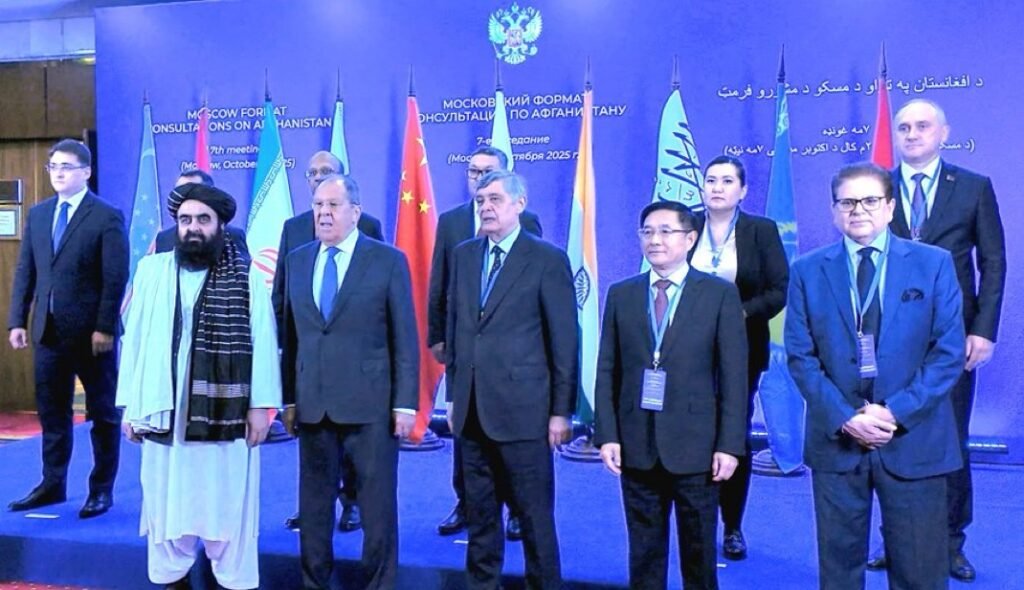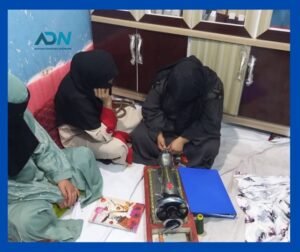Drone Strike Tests Regional Security After Mutaqi’s Moscow Remarks

Seventh Moscow Format meeting. (Photo: Taliban Foreign Ministry/X)
By Kazim Jafari
In his address at the 7th Moscow Format meeting, Taliban Foreign Minister Amir Khan Mutaqi delivered a carefully worded speech that reflected both Afghanistan’s growing diplomatic assertiveness and its struggle to redefine its regional image.
While much of his speech focused on stability and cooperation, one segment stood out — his remarks on Daesh(ISIS) and regional security. Beneath the surface of his measured words lay an unmistakable subtext aimed at Pakistan, though he avoided naming it directly.
Mutaqi began by rejecting international claims that militant groups operate freely in Afghanistan, asserting, “No group exists in Afghanistan that uses our territory to create problems for other countries.”
This statement directly countered a joint declaration by several nations expressing concern over extremist groups in Afghanistan. However, his call for “countries affected by insecurity to take responsibility for addressing their own challenges” was widely seen as a thinly veiled reference to Pakistan, which has long accused the Taliban of harboring the Tehrik-e-Taliban Pakistan (TTP) — a claim Kabul denies.
He further stated that Afghan intelligence had found evidence of Daesh and other groups establishing “training and equipping centers in other countries in the region.” The implication was unmistakable: the Taliban sought to reverse the narrative, suggesting that Pakistan, not Afghanistan, was now the source of regional militancy. This marked a rhetorical shift from decades of Islamabad portraying itself as the victim of cross-border terrorism.
On Thursday, October 9, the day Mutaqi departed for India after receiving a UN Security Council travel waiver, Kabul came under attack, reportedly by Pakistani drones. Early reports claimed the strike targeted Mufti Noor Wali Mehsud, the TTP leader, but he soon released an audio message asserting he was alive and operating in Pakistan’s tribal areas, urging his followers to “continue jihad as normal.”
The conflicting reports highlighted the opaque nature of regional counterterrorism operations, where facts and narratives shift quickly.
Even the former U.S. ambassador to Afghanistan publicly questioned whether Pakistan had carried out the strike, reflecting the growing uncertainty around Islamabad’s actions particularly as India deepens its engagement with theTaliban, a move closely observed by Pakistan.
Following the drone attack, Taliban spokesman Zabihullah Mujahid posted on social media that “an explosion has been heard in Kabul. People should not worry. All good. Investigation has started. No reports of harms have been reported.”
His restrained tone appeared to be an effort to de-escalate tensions at a delicate diplomatic moment.
Meanwhile, Najib Nangial, an Afghan political analyst in exile, criticized the Taliban’s domestic weakness, writing that the group’s real problem was not military capability but the absence of national unity and public trust. He argued that without popular support and inclusive governance, Afghanistan would remain vulnerable to foreign interference and aggression.
Taken together, Mutaqi’s speech, the drone strike, and the ensuing reactions reveal a volatile regional landscape.
The Taliban is eager to project itself as a sovereign, stabilizing force while distancing itself from Pakistan’s influence. Yet, the same events expose the deep mistrust and competing narratives that continue to shape Afghanistan–Pakistan relations.
Mutaqi’s Moscow address signaled more than diplomacy — it was a subtle declaration of strategic independence. Whether this approach leads to genuine regional balance or renewed confrontation remains to be seen, but one thing is clear: the Taliban is testing its voice on the world stage, and Pakistan is listening closely.
Kazim Jafari is a political science student at the University of Heidelberg in Germany.
Note: The contents of the article are of sole responsibility of the author. Afghan Diaspora Network will not be responsible for any inaccurate or incorrect statement in the articles.






